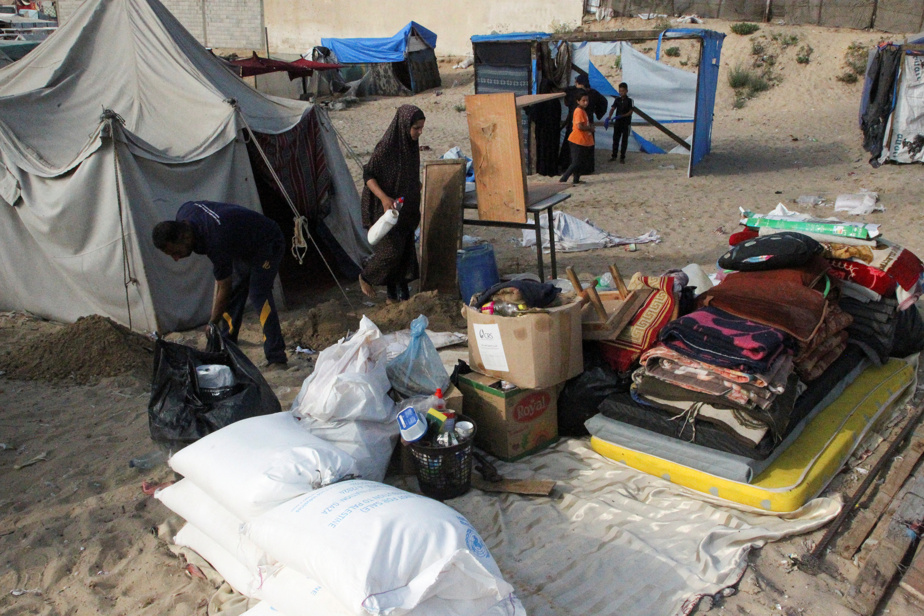(Rafah) The Israeli army on Thursday shelled the town of Rafah, in the south of the Gaza Strip, where ground fighting with Hamas rages after a tour of the Middle East by the head of American diplomacy, Antony Blinken , to try to secure a cease-fire.
After more than eight months of war, the United States is working to reach an agreement based on a plan announced by President Joe Biden, on which the Palestinian Islamist movement has sent the mediating countries a first response, while Israel has not made its position officially known.
Tension further rose on Israel’s northern border with Lebanon, where the Islamist movement Hezbollah, an ally of Hamas, announced Thursday that it had launched attacks “with rockets and drones” against nine Israeli army positions.
Israel has promised to respond “with force” to all “aggressions” by Hezbollah.
After multiple rocket attacks Wednesday on northern Israel, the Lebanese movement claimed that this new attack aimed to avenge the death of an important commander, Taleb Sami Abdallah, killed Tuesday in a targeted Israeli strike on southern Lebanon .
In the Gaza Strip, heavy artillery fire and airstrikes targeted several areas on Thursday, including the town of Rafah, on the border with Egypt, according to AFP correspondents.
Hamas’ military wing said it was engaged in street fighting in western Rafah, where witnesses reported fire from Apache helicopters.
The soldiers “continue their targeted operations in the Rafah sector,” the army said, adding that they “eliminated several terrorists in close combat” on Wednesday.
Witnesses spoke to AFP of “a very violent night” in Rafah, due to bombings and incursions by Israeli soldiers.
The army launched a ground offensive on Rafah on May 7, forcing a million Palestinians to flee, according to the UN, most of them now grouped in the coastal area of al-Mawasi, described as a “humanitarian zone.” by Israel.
The army denied on Thursday having bombed the al-Mawasi sector, as witnesses had claimed.
The NGO Norwegian Refugee Council (NRC) however denounced on Thursday “the use last week of an area designated as ‘humanitarian’ as a war zone, which betrays any idea of protection of civilians or respect for space humanitarian”.
“The capacity of humanitarian organizations to provide even minimal assistance is now completely reduced,” adds the NRC.
Israel had presented its offensive on Rafah as essential to eliminate Hamas, but fighting has resumed in recent weeks in several other regions.
The army said Thursday that it was continuing its operations in central Gaza, where three bodies were found in a bombed house in the Nousseirat camp, according to Civil Defense.
“Hamas can’t see that we are tired? We are dead, destroyed. The war must end at any cost,” Abu Chaker, a resident of Gaza City in the north of the besieged territory, told AFP.
On Wednesday in Doha, Mr. Blinken said the United States would work with Qatar and Egypt towards a ceasefire.
The plan announced on May 31 by Joe Biden provides, in a first phase, for a six-week ceasefire accompanied by an Israeli withdrawal from densely populated areas of Gaza, the release of certain hostages held in Gaza and the release of Palestinians imprisoned by Israel.
The content of Hamas’ response, delivered to mediators, was not revealed, but Blinken said “some changes” demanded by the Islamist movement were “feasible, others not.” “I think that gap can be bridged,” he added.
Israeli Prime Minister Benjamin Netanyahu has not officially responded to the plan announced by Joe Biden and says he will continue the war until the defeat of Hamas, in power in Gaza since 2007 and considered a terrorist organization by Israel. , the United States and the European Union.
Hamas, for its part, is demanding a definitive ceasefire and the withdrawal of the Israeli army from Gaza. The Islamist movement on Wednesday called on “Mr. Blinken and the Biden administration to put direct pressure” on Israel to reach a deal.
According to a source close to the discussions, Hamas’ response contains “amendments” to the initial plan, “including a timetable for a permanent ceasefire and the full withdrawal of Israeli troops from Gaza.”
The Families Forum, the main association of relatives of hostages, urged the government to act quickly because “any delay could seriously endanger the hostages. »
The war was sparked on October 7 by an unprecedented attack carried out by Hamas from the Gaza Strip in southern Israel, which resulted in the deaths of 1,194 people, mostly civilians, according to an AFP tally established from official Israeli data.
Of 251 people kidnapped, 116 are still held hostage in Gaza, of whom 41 are dead, according to the army.
In response, the Israeli army launched an offensive that left 37,232 people dead in the territory, mostly civilians, including at least 30 in 24 hours, according to data from the Ministry of Health of the Gaza government, led by the Hamas.
A UN commission of inquiry found on Wednesday that Israel was responsible for “crimes against humanity”, including “extermination”, in the Palestinian territory. She also accused the Israeli authorities and seven Palestinian armed groups, including the armed wing of Hamas, of war crimes.
Israel on Thursday accused the commission of making “false accusations and slander” against its army.




